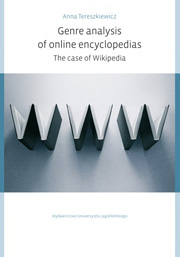6 - Wikipedia discourse features
Published online by Cambridge University Press: 05 September 2014
Summary
The continuum of Wikientries
As mentioned above, the reproduction of a specific genre depends to a large extent on the knowledge of genre conventions and on an author's linguistic awareness, but also on the medium in which the genre appears. As Yates and Orlikowski (1992) observe, the nature of the medium, its affordances and constraints, guide users towards specific communicative choices. Wikipedia constitutes the product of a special environment, which is digital, open and collaborative. Therefore, it is relevant to investigate the influence of this environment on the discourse structure of the free encyclopedia.
Since Wikipedia is created collectively by volunteers, it is interesting to study the process of choice the authors make between traditional discourse structures and conventional language means and the introduction of generically foreign elements (i.e. going beyond the convention) as well as to study the influence of communicative competence on individual ways of editing. A further aim of the analysis is to verify our initial hypothesis concerning the discourse layer of Wikipedia and to find out whether articles are structured according to recurring principles, i.e. whether the authors apply homogeneous norms and rules when creating articles as well as to assess the influence of authors’ individual stylistic choices on the realization of the genre and, therefore, on its changes.
As stated in the introduction, the analysis covers all the entries beginning with letter U available in Wikipedia, that is 968 articles. The entries were analysed at different levels with respect to dominant discourse properties.
- Type
- Chapter
- Information
- Genre Analysis of Online EncyclopediasThe Case of Wikipedia, pp. 99 - 168Publisher: Jagiellonian University PressPrint publication year: 2010



